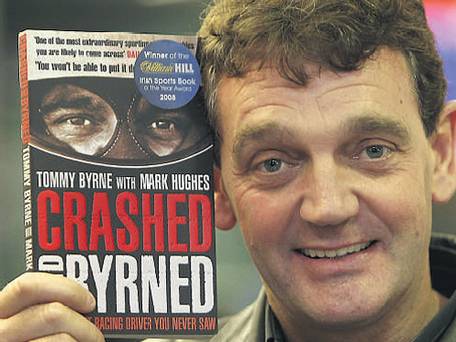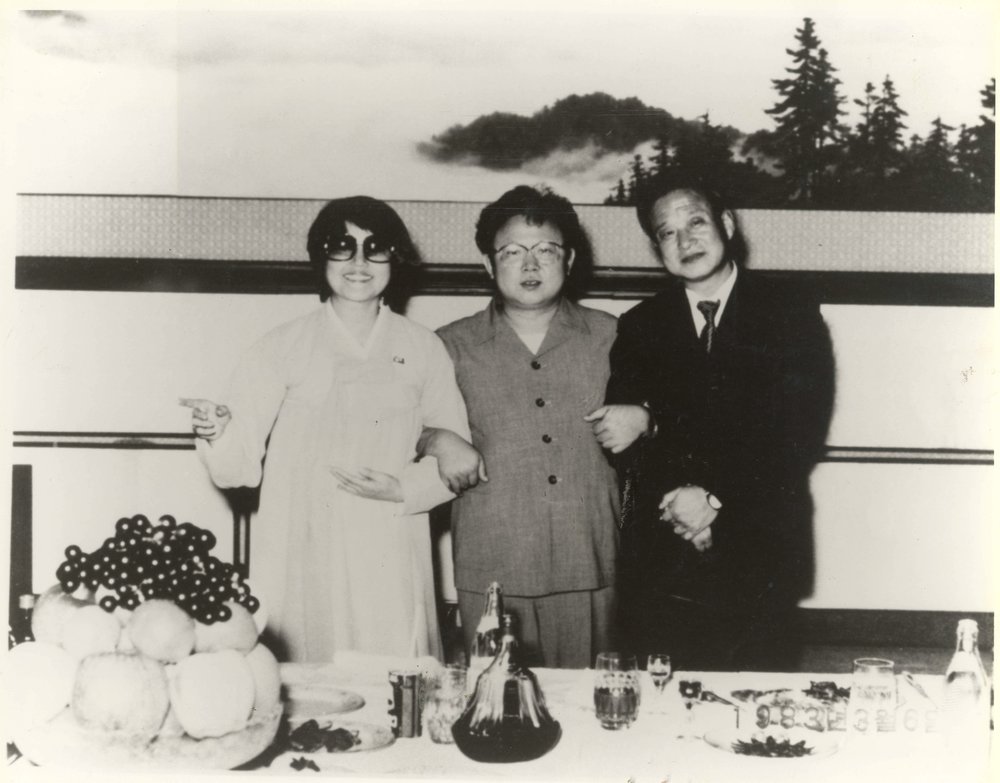Not all racing drivers are created equal. New world champion Nico Rosberg is the son of a former F1 champion, grew up in Monaco, speaks five languages and turned down an offer to study aeronautical engineering at Imperial College, London.
On the other hand, 1980s racer Tommy Byrne was a working-class chancer from Dundalk who was permanently skint and got nicked for stealing. Yet the evidence suggests he was one of the fastest natural drivers who ever sat in a racing car, and who even gave Ayrton Senna a run for his money when both of them drove for the Van Diemen team at the start of the Eighties. But despite his gifts, he never quite attained the highest echelon of motorsport.
 Byrne's reputation as a star-crossed genius who wasted his extravagant natural talent through his reckless dalliances with drugs, booze and women was enshrined in legend in his book Crashed and Byrned: The Greatest Racing Driver You Never Saw (2008, pictured right). Now here's Seán Ó Cualáin's documentary, which puts vivid flesh on the story's bones with a plentiful stash of archive footage, a colourful bunch of talking heads, and plenty of opinionated input from Byrne himself, who's now 58, lives in Florida, and in the racing season teaches advanced driving courses at the Mid-Ohio Sports Car Course.
Byrne's reputation as a star-crossed genius who wasted his extravagant natural talent through his reckless dalliances with drugs, booze and women was enshrined in legend in his book Crashed and Byrned: The Greatest Racing Driver You Never Saw (2008, pictured right). Now here's Seán Ó Cualáin's documentary, which puts vivid flesh on the story's bones with a plentiful stash of archive footage, a colourful bunch of talking heads, and plenty of opinionated input from Byrne himself, who's now 58, lives in Florida, and in the racing season teaches advanced driving courses at the Mid-Ohio Sports Car Course.
In fact you might say it didn't turn out too badly for Byrne, who evidently enjoys a comfortable lifestyle in the States and has managed to leave his debauched excesses behind him (as fellow Irishman and F1 veteran John Watson puts it, "If there was a gold medal for shagging, he'd have won it time and time again"). He hit rock bottom when he ended up driving for some sort of gangster in Mexico, who lived a Scarface-style life of drugs and hookers, and gave Byrne an electrifying wake-up call by firing a pistol at him. He was found drowned in his swimming pool not long afterwards.
What has made Byrne's story so tantalising, apart from his garish exploits and refreshing tactlessness, is the way he hurtled meteorically from quaint local banger races in Ireland to the fringes of F1, but couldn't quite clinch the deal. In 1982, having sensationally blitzed his way to winning the Formula 3 championship (after only getting the drive because the temperamental Senna had taken a sabbatical), he drove in a couple of Grands Prix for the obscure F1 team, Theodore Racing.
 More significant was his test session with McLaren at Silverstone in October '82 (pictured above), in which Byrne set faster lap times than John Watson or Niki Lauda in a Formula One car he'd never driven before, yet bewilderingly was never offered a drive with the team. Evidently team boss Ron Dennis had taken against Byrne's ducking, diving cockiness, and several interviewees here stress that in the exclusive, corporate and intensely political world of F1, a loose cannon like Byrne was always going to struggle to fit in. As team owner turned pundit Eddie Jordan puts it, "you didn't get stability with Tommy Byrne. You got chaos."
More significant was his test session with McLaren at Silverstone in October '82 (pictured above), in which Byrne set faster lap times than John Watson or Niki Lauda in a Formula One car he'd never driven before, yet bewilderingly was never offered a drive with the team. Evidently team boss Ron Dennis had taken against Byrne's ducking, diving cockiness, and several interviewees here stress that in the exclusive, corporate and intensely political world of F1, a loose cannon like Byrne was always going to struggle to fit in. As team owner turned pundit Eddie Jordan puts it, "you didn't get stability with Tommy Byrne. You got chaos."
Byrne himself launches tirades against the pretensions and snobbishness of F1, with a bit of class warfare for good measure: "People treat you different when you're broke than when you're rich... they can smell it." It's hard to tell how serious he's being when he says "it hasn't been a terrible life. I just lost out on $100m, that's all." Perhaps he might console himself with the thought that while his rival Ayrton Senna went all the way to the top, it's only Byrne who's still here to talk about it.

 Byrne's reputation as a star-crossed genius who wasted his extravagant natural talent through his reckless dalliances with drugs, booze and women was enshrined in legend in his book Crashed and Byrned: The Greatest Racing Driver You Never Saw (2008, pictured right). Now here's Seán Ó Cualáin's documentary, which puts vivid flesh on the story's bones with a plentiful stash of archive footage, a colourful bunch of talking heads, and plenty of opinionated input from Byrne himself, who's now 58, lives in Florida, and in the racing season teaches advanced driving courses at the Mid-Ohio Sports Car Course.
Byrne's reputation as a star-crossed genius who wasted his extravagant natural talent through his reckless dalliances with drugs, booze and women was enshrined in legend in his book Crashed and Byrned: The Greatest Racing Driver You Never Saw (2008, pictured right). Now here's Seán Ó Cualáin's documentary, which puts vivid flesh on the story's bones with a plentiful stash of archive footage, a colourful bunch of talking heads, and plenty of opinionated input from Byrne himself, who's now 58, lives in Florida, and in the racing season teaches advanced driving courses at the Mid-Ohio Sports Car Course. More significant was his test session with McLaren at Silverstone in October '82 (pictured above), in which Byrne set faster lap times than John Watson or
More significant was his test session with McLaren at Silverstone in October '82 (pictured above), in which Byrne set faster lap times than John Watson or  It’s an insane, credulity-stretching story, clearly and unfussily told. Interviewees include a spry, elderly Choi, and it’s a neat touch to have some of the more outlandish anecdotes illustrated by clips taken from Chin’s films. Choi managed to obtain a micro-cassette recorder and tape many of the pair’s conversations with the dictator – the cassettes later confirming that they had not willingly defected, as some nay-sayers on both sides of the divide later claimed. Chin’s comment that he hated “everything apart from not having to worry about money” is bitterly apposite; despite his semi-incarceration he was given unprecedented artistic and financial freedom by Kim Jong-il, a tragi-comic figure all too aware of his charisma deficit. Chin and Choi managed to play the game for several years, the pair well aware that they could be discarded in an instant should the Dear Leader fall out of love with them.
It’s an insane, credulity-stretching story, clearly and unfussily told. Interviewees include a spry, elderly Choi, and it’s a neat touch to have some of the more outlandish anecdotes illustrated by clips taken from Chin’s films. Choi managed to obtain a micro-cassette recorder and tape many of the pair’s conversations with the dictator – the cassettes later confirming that they had not willingly defected, as some nay-sayers on both sides of the divide later claimed. Chin’s comment that he hated “everything apart from not having to worry about money” is bitterly apposite; despite his semi-incarceration he was given unprecedented artistic and financial freedom by Kim Jong-il, a tragi-comic figure all too aware of his charisma deficit. Chin and Choi managed to play the game for several years, the pair well aware that they could be discarded in an instant should the Dear Leader fall out of love with them.